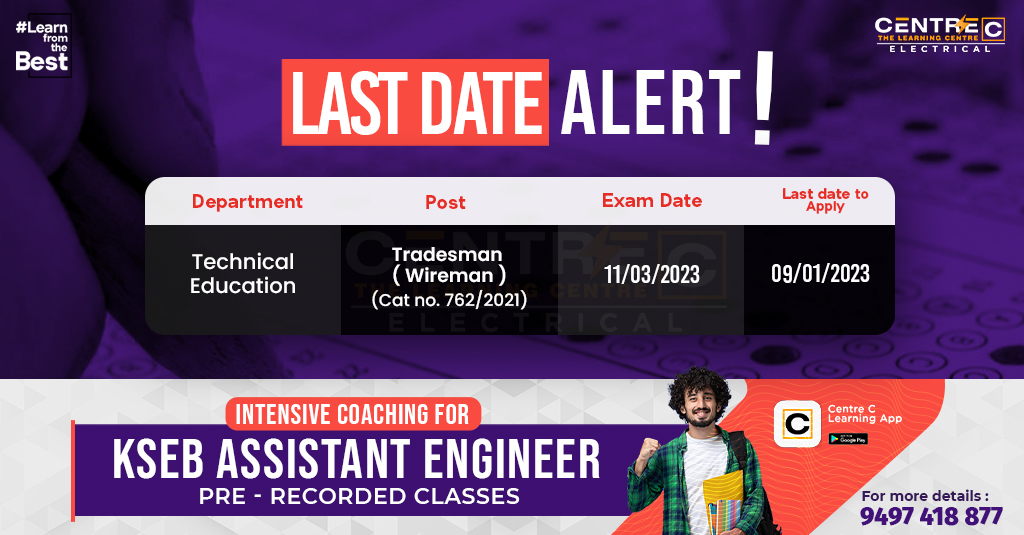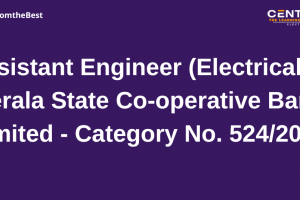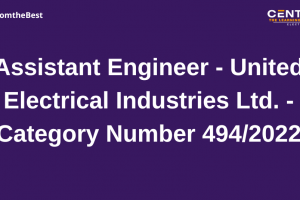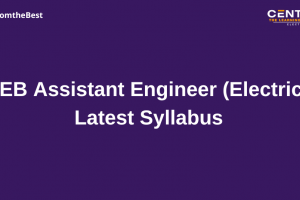
Tradesman (Wireman) – Category Number (762/2021) – Exam Date Announced
CENTRE-C ELECTRICAL
Tradesman (Wireman) – Category Number (762/2021) – Exam Date Announced
TRADESMAN (Wireman) IN
TECHNICAL EDUCATION (Cat.No.: 762/2021)
Date of Exam : 11.03.2023, SATURDAY
Main Topics:- Wireman (NTC Level)
Maximum Marks : 100
Duration : 1 Hour 30 Minutes
Medium of Question : English
Mode of Exam : OMR/ONLINE (Objective Multiple Choice)
Note : Candidates can submit their confirmation for writing this examination through one time registration profile from 21.12.2022 to 09.01.2023
Candidates who successfully submit their confirmation on or before 09.01.2023 can download the Admission Tickets through their One Time Registration Profile in the website www.keralapsc.gov.in from 25.02.2023
DETAILED SYLLABUS FOR THE POST OF TRADESMAN (Wireman) IN
TECHNICAL EDUCATION (Cat.No.: 762/2021)
(Total Marks – 100)
Module – 1 [10 Marks]
(a) Fundamentals of Electricity :
Effects of Electric Current, Fundamental Terms, Definition, Solder, Flux, Definition & Properties of Conductors, insulators, semiconductors, different types of insulators, types of wires & cables, specification of wires & cables – insulators, low medium & high voltage various types of cables.
(b) Laws of Resistance, Ohm’s Law, Kirchhoff’s Laws :
Resistance, pd, current, specific resistance, law’s of resistance, ohm’s law, series & parallel circuit, kirchhoff’s laws, wheat stone bridge, effects of variation of temperature on resistance, work, power, energy, efficiency, heating effect of electric current.
Module – 2 [10 Marks]
Cells & Batteries :
Electrolysis, Faradays laws of electrolysis, basic principle of electro plating & electro chemical equivalents, primary cell and secondary cell, lead acid cell, methods of charging care & maintenance of cells, grouping of cells of specified voltage & current, inverter, battery charger nickel alkali cell, efficiency of cells, power & capacity of cells.
Module – 3 [10 Marks]
House Wiring & Earthing :
Different methods of earthing IE, pipe, plate, importance of earthing, improving earth resistance, ELCB type of wiring and their uses, IE rules, wiring accessories, Such as lamp holder, switch, plug, bracket, ceiling rose, cutout, ICTP, ICDP
Illumination :
Construction, working & application of incandescent lamp flourscent tube, cfl, neon sign, halogen mercury vapor lamp, sodium vapour lamp
Module – 4 [10 Marks]
Magnetism :
Classification of magnets, method of magnetising magnetic materials, properties, care and maintaance para and diamagnetic and ferro magnetic materials principles of electromagnetism, max well’s cork screw rule, fleming’s left and right hand rules, magnetic field of current carrying conductor, solenoid mmf , flux density, reluctance, hysteresis, eddy current, principle of electromagnetic induction, faraday’s laws, Lenz’s laws, electrostatic capacitor, different types of function & uses.
Module – 5 [10 Marks]
Alternating Current & Poly Phase :
Comparison & advantage AC & DC related terms, frequency, instantaneous value, RMS value, average value, peak factor, form factor, sine wave, phase & phase difference, inductive & capacitive reactance, impedance power factor, active & reactive power single phase & 3 phase system, power consumption, series & parallel, PF, three phase star delta connection line and phase voltage, current and power in 3 phase circuits with balanced & unbalanced load.
Module – 6 [10 Marks]
Basic Electronics :
Semiconductor, atomic structure, P type and N types of materials, PN junction diode classification, reverse and forward bias, heat sink, specification of diode, PIV rating, half wave, full wave & bridge circuit, filter circuits, passive filter, LED, diode, types of transistor, UJT, SCR, regulator ics and zener diodes use and its application, ic voltage regulator JFET, logic gate AND gate
Module – 7 [10 Marks]
DC Generator and DC motor :
Introduction to dc generator and working principle, parts of DC generator, classification of generator self excited and separately excited their application types and characteristics of DC generator, series shunt and compound their applications, emf equation of DC motor working principle, types of motor, torque, speed, back emf, characteristics, speed control of DC motor, necessity of starter, types of starters, 2 point, 3 point , 4 point starters, protective devices used, method of speed control.
Module – 8 [10 Marks]
AC Generators, Motors and Starters :
Parts & construction of alternator, principle of working, types of alternator, EMF equation, various applications and power rating of alternator, General idea of loading and regulation of alternator, parallel operation of alternators, synchronising method.
AC single phase motor and types, capacitor start/run – start and run FHP motors and their uses various application of AC single phase motors.
Three Phase Motors :
Construction, Principle of operation of 3 phase induction motors squirrel cage and slip ring induction motors, rotor slip, rotor frequency and motor torque starting method, speed control method importance of phase sequence in 3 phase induction motor, single phasing preventere starters, DOL starters, delta starters, and autotransformer starter rotor resistance starter.
Module – 9 [10 Marks]
Transformers :
Power Transformer – it’s construction working parallel operation of transformer their connection, cooling transformer, emf equation, transformation ratio, ideal transformer, construction of core, shell, berry type, auxilliary parts, breather, conservator, buchholz relay, other protective device, transformer oil testing, OFF load and ON load, autotransformer it’s construction, working and uses, CT, PT, losses & efficiency.
Module – 10 [10 Marks]
Measuring Instruments :
Types of measuring instruments – MC and MI construction and working principle of ammeter, voltmeter , ohm meter , wattmeter , energy metre , pf metre, megger, earth tester CT and PT tong tester/clip on meter , multi meter
Generation, Transmission & Distribution of Electricity :
Generation – Diesel Power station, Steam power station, Hydroelectric Power Station, Nuclear Power Station.
Sub Station – Indoor, outdoor, pole mounting (EHT substation, HT substation, medium & low voltage substation )
UG Cable – Construction of cable, types, testing
NOTE : It may be noted that apart from the topics detailed above, questions from other topics prescribed for the educational qualification of the post may also appear in the question paper. There is no undertaking that all the topics above may be covered in the question paper.
For Detailed Syllabus :


Get prepared for all the Electrical Engineering exams with a single enrollment!😎
Specially structured to learn each subject from basic to advanced levels,
HIGHLIGHTS
✅ Recorded videos with Unlimited streaming
✅ 300+ hours of lectures
✅Comprehensive coverage of the latest syllabus, including Overseer Grade-I/KSEB Sub-Engineer
✅A highly trained and dedicated faculty team
✅ 150+ total tests
✅ Interactive quizzes
✅Onboard support and doubt clearance
✅Regular performance analysis and personal mentoring
Admissions Open…
1-year validity
Its your high time to choose the right decision!
For admissions call us at
📲 94 97 41 88 77
📲 94 97 41 88 66
CENTRE C ELECTRICAL SOCIAL MEDIA PLATFORMS
Our Social media platforms are exclusively for Electrical Engineering students, job candidates, teachers and all those who have passion for Electrical Engineering.
You will get
- Electrical engineering quiz
- Regular job notifications
- Exam notifications
- E – News
- E – Shots
- Study tips
- Electrical related discussion and all in this group.




